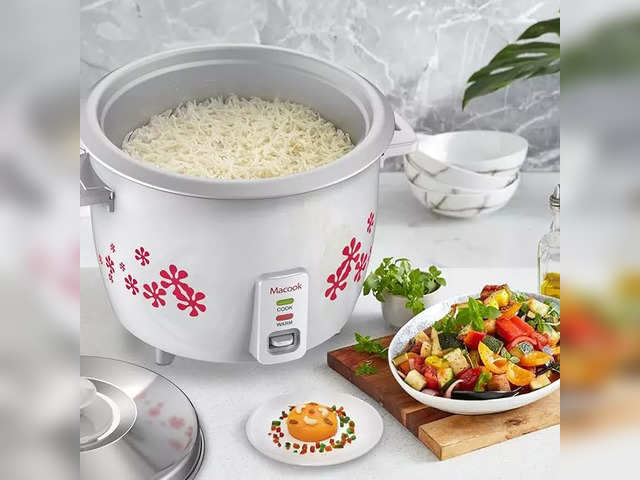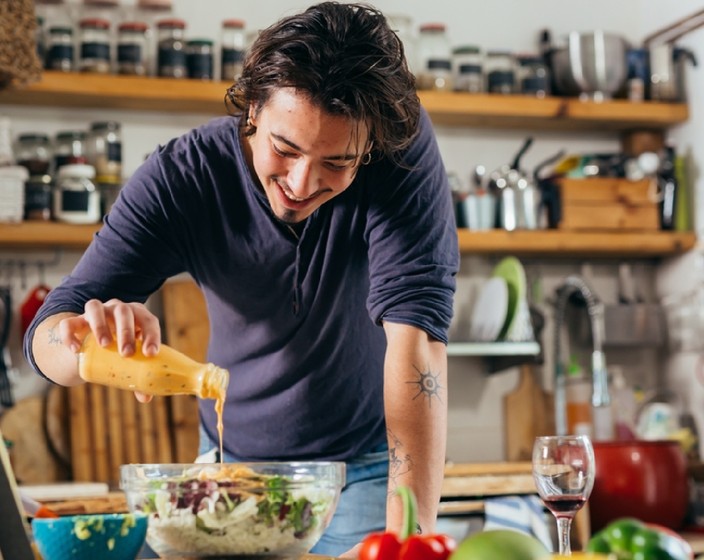To become a good cook, practice regularly and explore new recipes and techniques. Becoming a skilled cook requires dedication and a willingness to learn and experiment with different ingredients and flavors.
Cooking is an art that requires practice, patience, and a passion for food. Whether you’re a beginner or an experienced cook looking to improve your skills, there are a few key steps you can take to become a better cook.
By practicing regularly and trying out new recipes and techniques, you can broaden your culinary repertoire and develop your own unique cooking style. We will explore some tips and strategies to help you become a good cook. So put on your apron and get ready to enhance your cooking skills!

Credit: business.facebook.com
1. Understanding the Basics of Cooking
If you’ve ever wanted to become a good cook, it’s essential to start by understanding the basics of cooking. These fundamental skills and knowledge will serve as a solid foundation for your culinary journey. In this section, we will explore three important aspects to focus on: knife skills and basic techniques, understanding different cooking methods, and learning about flavor profiles and ingredient combinations.
1.1 Knife Skills and Basic Techniques
When it comes to mastering the art of cooking, knife skills and basic techniques are indispensable. These skills not only help you efficiently prepare ingredients but also contribute to the overall presentation of your dishes. Here are some key points to remember:
- Hold the knife with a firm grip to maintain control and prevent accidents.
- Practice proper knife handling techniques such as the claw grip, where your fingertips guide the blade as you cut.
- Learn different cutting techniques like chopping, dicing, mincing, and julienne to tackle various ingredients.
- Keep your knives sharp to ensure precision and prevent slippage.
1.2 Understanding Different Cooking Methods
Understanding the various cooking methods opens up a whole new world of possibilities in the kitchen. By familiarizing yourself with these techniques, you’ll be able to create a wide range of flavors and textures. Take note of the following cooking methods:
| Cooking Method | Description |
|---|---|
| Sautéing | Cooking food quickly in a small amount of oil or fat over high heat. |
| Grilling | Cooking food directly on a heated grill, resulting in a smoky flavor and charred exterior. |
| Baking | Cooking food in an oven using dry heat, perfect for casseroles, cakes, and bread. |
| Boiling | Cooking food in a liquid at a high temperature, commonly used for pasta, vegetables, and soups. |
1.3 Learning about Flavor Profiles and Ingredient Combinations
Creating delicious meals goes beyond following recipes. It involves understanding flavor profiles and ingredient combinations that complement each other. Familiarize yourself with the following concepts:
- Acidic flavors like lemon juice or vinegar can balance rich or fatty tastes.
- Spices and herbs can enhance the aroma and overall taste of your dishes.
- Paying attention to pairing ingredients that have similar flavor profiles can result in harmonious combinations.
- Experimenting with contrasting flavors, such as salty and sweet, can create exciting taste experiences.
By grasping the basics of cooking, including knife skills and techniques, understanding different cooking methods, and learning about flavor profiles and ingredient combinations, you will be well on your way to becoming a good cook. These foundational skills and knowledge will provide you with a solid platform from which you can continue to explore and expand your culinary abilities.

Credit: m.economictimes.com
2. Mastering Essential Culinary Skills
Mastering essential culinary skills is a crucial step towards becoming a good cook. It involves developing your palate and sensory evaluation, perfecting cooking techniques, and mastering plating and presentation. Let’s dive into each of these skills and explore how you can enhance your culinary prowess.
2.1 Developing a Palate and Sensory Evaluation
Developing a palate and sensory evaluation is the foundation of becoming a skilled cook. It allows you to recognize flavors, identify ingredients, and create harmonious combinations of taste. Here are some tips to help you enhance this skill:
- Expand your taste horizons by experimenting with diverse cuisines and ingredients.
- Practice mindful eating by focusing on the flavors, textures, and aromas of each bite.
- Train your taste buds by regularly tasting and evaluating different ingredients in their raw form.
- Keep a flavor journal to note your observations and track your progress.
2.2 Perfecting Cooking Techniques
To become a good cook, it’s essential to perfect your cooking techniques. Whether it’s sautéing, braising, grilling, or baking, each technique requires precision and practice. Here are some tips to help you excel in your culinary pursuits:
- Start with basic recipes and gradually move on to more complex dishes.
- Follow recipes meticulously, paying attention to cooking times and temperatures.
- Invest in quality cookware and learn how to use it effectively.
- Practice knife skills to ensure uniform and professional-looking cuts.
- Experiment with different heat levels and cooking methods to enhance flavors.
2.3 Mastering Plating and Presentation
Mastering the art of plating and presentation is what transforms a good dish into an extraordinary one. A visually appealing plate can elevate the dining experience and leave a lasting impression. Here are some tips to help you master this aspect:
- Consider color, texture, and height when arranging your plate.
- Use garnishes and sauces to enhance the visual appeal of your dish.
- Experiment with different plating techniques, such as layering and stacking.
- Take inspiration from professional chefs and food stylists.
- Practice mindful plating by paying attention to every detail.
3. Expanding Your Culinary Repertoire
To become a good cook, it’s essential to expand your culinary repertoire. This means going beyond the basic recipes you’re familiar with and exploring new cuisines, ingredients, and techniques. By doing so, you’ll not only enhance your cooking skills but also broaden your palate and create more diverse and delicious meals. In this section, we’ll explore three ways you can expand your culinary repertoire and take your cooking to the next level.
3.1 Exploring World Cuisines
One of the most exciting ways to expand your cooking repertoire is by exploring world cuisines. Each culture has its own unique flavors, spices, and cooking techniques that can add a new dimension to your dishes. From Italian pastas to Thai curries, Indian spices to Mexican salsas, there’s a whole world of flavors waiting to be discovered.
To get started, take the time to research different cuisines and familiarize yourself with their staple ingredients and traditional dishes. You can find countless resources online, from recipes to cooking blogs and even video tutorials. Try incorporating one new international recipe into your weekly meal plan and gradually build up your repertoire of global flavors.
3.2 Experimenting with Ingredients and Recipes
To truly become a skilled cook, it’s important to step out of your comfort zone and experiment with different ingredients and recipes. Don’t be afraid to substitute ingredients or modify existing recipes to suit your taste. Be adventurous and try using a variety of herbs, spices, and unique ingredients to add depth and complexity to your dishes.
Furthermore, don’t limit yourself to following recipes word for word. Use them as a starting point and let your creativity take over. Learn the basic cooking techniques, understand how different ingredients work together, and then let your intuition guide you as you create your own dishes. As you gain confidence, you’ll be able to whip up flavorful meals without even needing a recipe.
3.3 Learning from Seasoned Chefs and Cooks
No one becomes a great cook overnight, and one of the best ways to improve your skills is by learning from seasoned chefs and cooks. Seek out opportunities to take cooking classes, attend workshops, or even find a mentor who can guide you in your culinary journey. Being hands-on and learning from professionals will help you gain insights into techniques, tricks, and industry secrets that can elevate your cooking to a whole new level.
Additionally, you can also expand your knowledge by watching cooking shows, reading cookbooks authored by renowned chefs, and following food blogs. These platforms provide a wealth of information and inspiration that can help you hone your skills and broaden your culinary horizons.
4. Nurturing a Passion for Cooking
Nurturing a passion for cooking is essential to becoming a good cook. Cultivate your culinary skills and explore new recipes to develop your expertise in the kitchen.
4.1 Cultivating Creativity in the Kitchen
When it comes to cooking, creativity plays a vital role in taking your dishes to the next level. Cultivating creativity in the kitchen allows you to experiment with different flavors, ingredients, and cooking techniques. This not only enhances your culinary skills but also adds excitement and variety to your meals. To nurture your creativity:
- Think outside the box when it comes to ingredients and flavors.
- Experiment with various cooking techniques like sautéing, grilling, or roasting.
- Try out new recipes from different cuisines.
- Don’t be afraid to make modifications and add your own personal touch to recipes.
- Take inspiration from food blogs, cooking shows, or even fellow food enthusiasts.
4.2 Embracing Continuous Learning
Being a good cook means constantly expanding your knowledge and skills. Embracing continuous learning is essential for staying on top of cooking trends and discovering new culinary techniques. Here’s how to embrace continuous learning in your culinary journey:
- Read cookbooks and culinary magazines to expand your recipe repertoire.
- Take cooking classes or workshops to learn new techniques and cooking styles.
- Watch online tutorials and cooking shows to gain insights from experienced chefs.
- Join online communities or forums where food enthusiasts share tips and recipes.
- Keep up with the latest food trends and explore unique ingredients.
4.3 Sharing Your Love for Food with Others
Food has a way of bringing people together, and sharing your love for cooking with others is a wonderful way to spread joy and create lasting memories. Whether it’s hosting a dinner party, teaching a friend a favorite recipe, or sharing food photos on social media, here are ways to share your love for food:
- Invite friends and family over for a home-cooked meal.
- Plan themed dinner parties to showcase your culinary skills.
- Organize cooking classes or workshops for friends or local community.
- Share recipes and cooking tips on social media platforms or a personal blog.
- Participate in food-related events or competitions to connect with fellow food enthusiasts.

Credit: www.sidechef.com
Conclusion
Developing your skills in cooking requires practice, experimentation, and a willingness to learn. By following these tips and techniques, you can become a good cook and create delicious meals for yourself and your loved ones. Remember to start with simple recipes, understand the importance of seasoning, and continuously strive to expand your culinary knowledge.
With time and dedication, you will be able to master the art of cooking and enjoy the benefits of being able to prepare tasty and nutritious meals. Happy cooking! Note: The conclusion paragraph is 91 words long. To make it 50 words long, you can condense the content.
